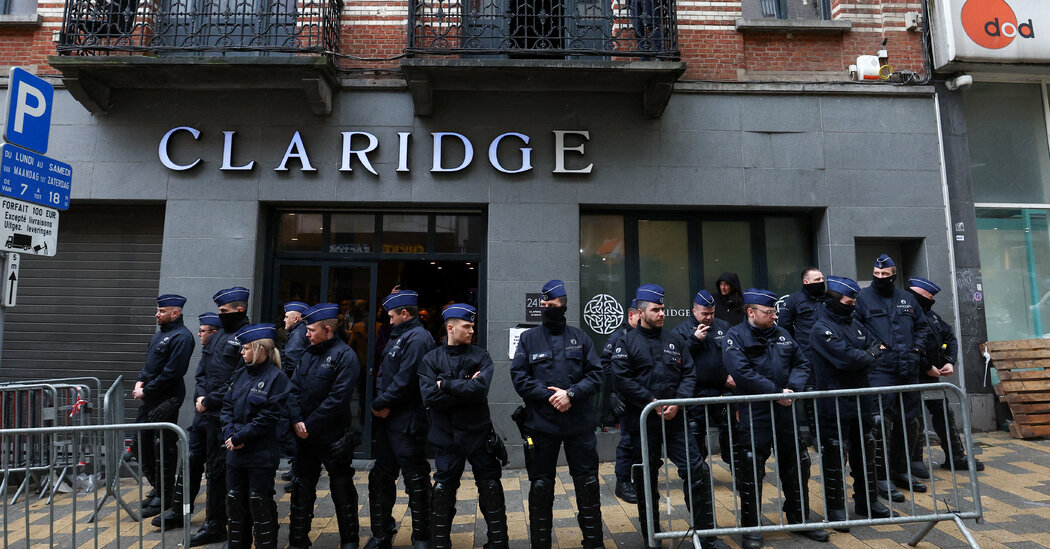
[ad_1]
Pickpocketing Chekhov for dramatic capital is almost a rite of passage among playwrights, but only Christopher Durang invested the loot in beefcake.
In his play “Vanya and Sonia and Masha and Spike,” Vanya and Sonia are more-or-less familiar transplants from the Russian hinterlands to Bucks County, Pa., dithering so much about the purpose of life that they neglect to have one. Masha, though a movie star, is a Chekhov type, too: endlessly fascinating, especially to herself.
But you will not find Spike anywhere in the canon; a jovial, amoral, ab-tastic himbo, he is apparently unfamiliar with the function of clothes. They keep coming off.
Durang, who died on Tuesday night at 75, was likewise a stripper, peeling the pants off serious theater, both to admire and ridicule what it was packing beneath. When “Vanya” won the Tony Award for best play in 2013, it was the culmination of a writing life spent remaking the respectable precedents and characters of the past in the snarky image of his own times. Drama became comedy, but then — surprise! — swung back toward drama, then swung back again, never quite settling. In making us laugh and then demanding a retraction, Durang became an absurdist Neil Simon for a post-great generation.
Often enough, the laughing was of the can’t-catch-your-breath variety, further dizzying the ambivalence of the culturati by punching both high and low. I didn’t see any of the plays and sketches he wrote while a student at the Yale School of Drama in the early 1970s, often collaborating with pals like Sigourney Weaver, Meryl Streep, Albert Innaurato and Wendy Wasserstein, but the titles tell you a lot: “Better Dead Than Sorry,” “The Life Story of Mitzi Gaynor,” “When Dinah Shore Ruled the Earth,” “The Idiots Karamazov.”
Surely these were not for all markets. (Many were performed at the tiny Yale Cabaret.) But by the time of his first commercial hit — “Sister Mary Ignatius Explains It All for You,” in 1979 — Durang had widened his satire to reach bigger targets and thus bigger audiences. In “Mary Ignatius,” a vicious nun lectures the audience on Roman Catholic practice, liberally passing off personal obsessions as holy doctrine. Her list of those who are going to hell includes Mick Jagger, Patty Hearst, Betty Comden and Adolph Green.
Jokes like that are funnier if you know who the songwriters Comden and Green are, but Jagger and Hearst provide insurance in case you don’t. Either way, you can’t miss his direct hit on authority figures and, through them, the seemingly random violence done by institutions to individuals. In midcareer plays like “Baby With the Bathwater” (1983) and “The Marriage of Bette and Boo” (1985), marriage and the American family are often the institutions in question, and the sexual or emotional abuse of children the violence. Durang would force you to laugh — a 1987 play was called “Laughing Wild” — not to dull the pain but to hone it.
Later, as his subjects became more existential, his satire was directed more narrowly at individual desperation. Cellphones and video games send his Vanya off the deep end; in “Miss Witherspoon” (2005), a woman who is fed up with the world (and afraid that a satellite will fall on her head anyway) ends her life, only to meet, in purgatory, a spiritual guide who badgers her to reincarnate.
You’d think that suicide would be a bridge too far for comedy, yet for Durang no bridge went quite far enough. He was looking to connect the hitherto unconnectable, as if to demonstrate that everything good and awful is real and present at the same time. His plays thus became fuller with time, their stark satirical premises giving way to something more nuanced, if cluttered with all the mismatched things he wanted to say. His “Vanya,” I wrote in a review, was like fine luggage packed in haste.
Still, he was reliably funny; for a gay boy raised in the church in the American 1950s, humor was camouflage that never came off. On the other hand, as a Harvard- and Yale-trained highbrow, he couldn’t help but pitch his camp to the cognoscenti — and not only in plays.
For decades he performed as part of an act he called Christopher Durang and Dawne, satirizing cabaret singers and their sometimes jaw-dropping material. (Dawne was two people: Sherry Anderson and John Augustine, Durang’s partner and then husband.) Applying glitter and riffs to a truly inapt Stephen Sondheim number (“Welcome to Kanagawa” from “Pacific Overtures”) or making an upbeat medley from the movie musicals of Liv Ullman and Peter O’Toole, they demonstrated that incompatible things belonged together.
That was no snark; it was a mission statement, perhaps best encapsulated in “Why Torture Is Wrong, and the People Who Love Them,” his 2009 comedy about violence and terror. Or at least in its title, a grammatical misalliance. No wonder he fell so hard for Chekhov, the great raised-eyebrow dramatist of discord and collapse. Still, Durang one-upped him, proving that even end times can be hilarious with good enough jokes and abs.
[ad_2]
Source link






